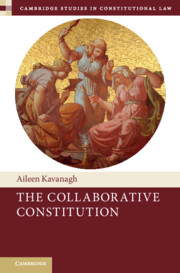Book contents
- The Collaborative Constitution
- Cambridge Studies in Constitutional Law
- The Collaborative Constitution
- Copyright page
- Brief Contents
- Contents
- Acknowledgements
- Abbreviations
- Introduction
- Part I Institutions and Interactions
- Part II Rights in Politics
- Part III Judge as Partner
- 7 Judge as Partner
- 8 The HRA as Partnership in Progress
- 9 Calibrated Constitutional Review
- 10 Courting Collaborative Constitutionalism
- Part IV Responsive Legislatures
- Bibliography
- Index
- Books in the series
10 - Courting Collaborative Constitutionalism
from Part III - Judge as Partner
Published online by Cambridge University Press: 12 October 2023
- The Collaborative Constitution
- Cambridge Studies in Constitutional Law
- The Collaborative Constitution
- Copyright page
- Brief Contents
- Contents
- Acknowledgements
- Abbreviations
- Introduction
- Part I Institutions and Interactions
- Part II Rights in Politics
- Part III Judge as Partner
- 7 Judge as Partner
- 8 The HRA as Partnership in Progress
- 9 Calibrated Constitutional Review
- 10 Courting Collaborative Constitutionalism
- Part IV Responsive Legislatures
- Bibliography
- Index
- Books in the series
Summary
This chapter documents the array of tools and techniques judges use when carrying out their adjudicative role as part of a broader collaborative enterprise. Whilst the theoretical literature often presents courts as speaking in prospective, prescriptive, and peremptory terms, this chapter uncovers a vast array of collaborative devices which courts use in subtle but significant ways. Presenting the courts ’as catalyst’, and foregrounding the idea of ’judge as nudge’, this chapter explores the varied phenomena of judicial alerts, prods and pleas, soft suggestions, and judicial advice. It uses the controversial Nicklinson case on assisted suicide as a vehicle through which to examine collaborative constitutionalism before the courts. The chapter concludes by arguing that the devices canvassed in this chapter are best conceived as collaborative devices, rather than the ’passive virtues’ defended in Alexander Bickel’s canonical account of adjudication by the US Supreme Court.
Keywords
- Type
- Chapter
- Information
- The Collaborative Constitution , pp. 297 - 330Publisher: Cambridge University PressPrint publication year: 2023

